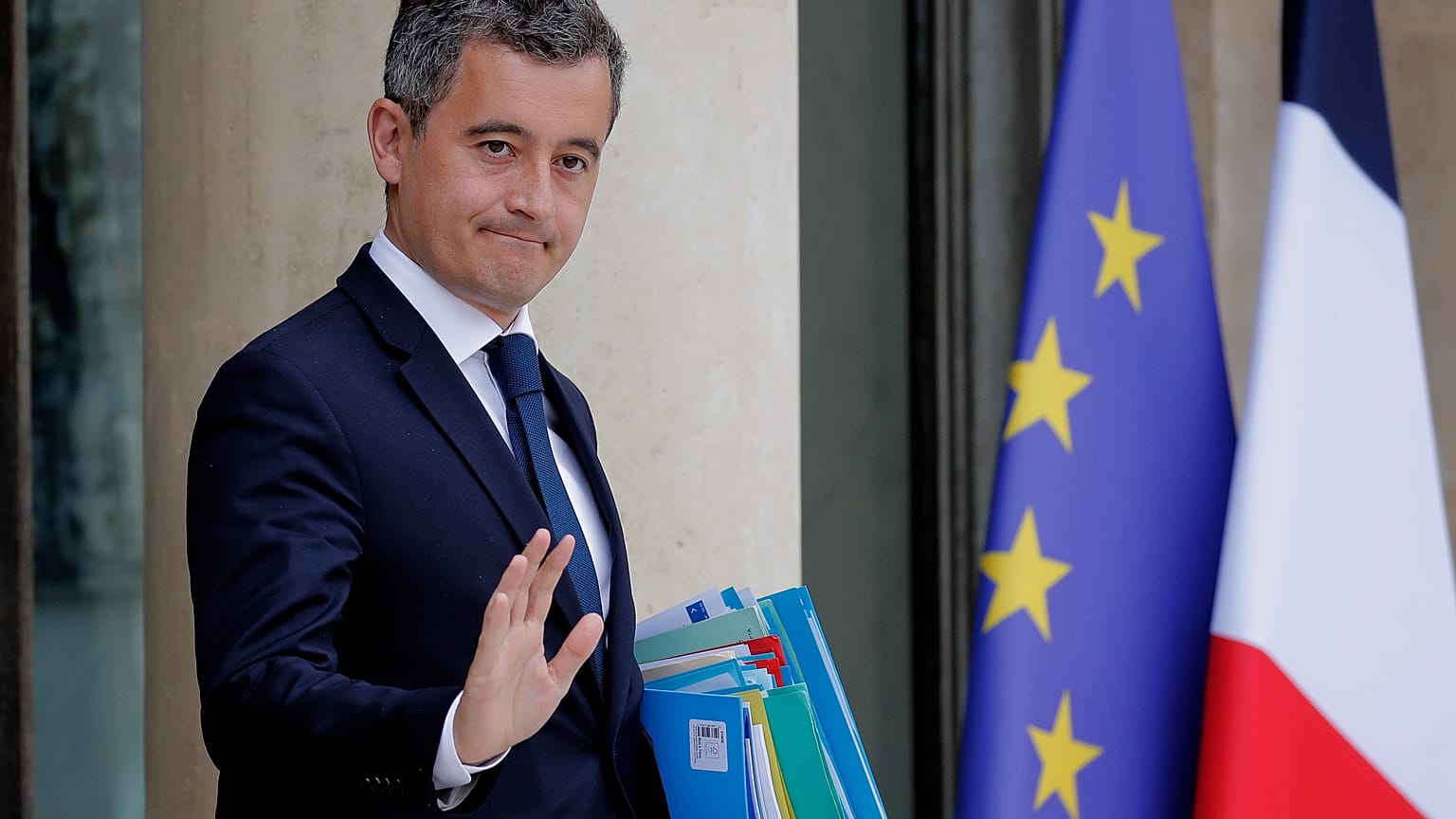Human rights groups say the deportation of Magomed Gadaev is linked to rising stigma against Chechens in France since the beheading of teacher Samuel Paty last year.
France has been criticised for deporting Chechen refugee Magamoed Gadaev to Russia despite several court rulings saying he should not be expelled, human rights groups said.
In 2010, Gadaev fled to Poland from Chechenya, Russia’s Muslim-majority southern region, where he served a prison sentence for alleged ties with separatists. He says he was tortured in prison.
Gadaev was granted asylum in Poland before moving to France, where he became a witness in prominent torture cases involving Chechen security forces.
"Due to the persecution he has suffered in the past and his role as a witness in cases of torture committed by the Chechen authorities, Magomed Gadaev is in danger of being tortured again and, possibly, even killed," warned Amnesty International.
Gadaev appealed his deportation before the administrative court of Limoges. According to his lawyer Arnaud Toulouse, "this is the last chance to try to bring him back to France and save his life."
Toulouse said the decision to expel his client was made by the Ministry of the Interior as a consequence of rising stigma against migrants from the Caucasus, following the murder of teacher Samuel Paty in October last year by an 18-year-old Chechen.
The National Asylum Court ruled on March 10 that France would violate the 1951 Geneva Convention on the status of Refugees by returning Gadaev to a country where his life or freedom would be endangered, the lawyer said.
The court also opposed the expulsion of Gadaev to Poland, since he was threatened with deportation to Russia from there, acknowledging he was entitled to receive asylum in France.
Ministry accused of 'bypassing' court orders
The Interior Ministry simply "bypassed" the judicial system, the lawyer went on, adding that the legal basis for the deportation was not communicated to him.
Toulouse also said that French authorities did not take into account the fact that he sent a new request to the National Asylum Court to suspend the deportation order on the night before his client's flight to Moscow.
The flight was delayed because Gadaev slashed his stomach in protest. But he was quickly stitched up so that he could be put on his flight as planned.
According to information communicated by Sheremetyevo airport, where Gadaev was held in the transit zone for 12 hours by the FSB, he was transferred to a flight to Novy Urengoy in western Siberia, where his brother lives.
On April 10, Gadaev turned to the police in Novy Urengoy with a request to provide him with state protection. He was then handed over to Chechen security forces.
According to Memorial, a Russian human rights group, a criminal case was opened against Gadaev under Article 222 of the Criminal Code of the Russian Federation under a count of illegal arms trafficking. Investigators said they found a cache of weapons.
'National security threat'
The processing of applications at the French Agency for the Protection of Refugees and Stateless Persons (OFPRA) usually takes between two weeks and four months. Gadaev filed it back in May 2019. A year and a half later, there was still no answer.
But things sped up after the murder of Paty in October. Just three days after the terror attack, Gadaev's request was rejected because he posed a "potential threat to national security."
Around the same time, French Interior Minister Gerald Darmanin started security talks with his Russian counterpart Vladimir Kolokoltsev. According to media reports, those centred on the possibility of returning Russian illegal immigrants suspected of ties with radical Islamism and recorded in the so-called "S-File" (threat to state security) of French intelligence services.
"What kind of agreement was made? Was it just a verbal agreement? If not, the agreement should be submitted for public discussion and taken under the control of Parliament," said Jean-François Dubost, head of the "protection of populations" programme at Amnesty International France.
Getting on the S-File is not an indictment. If this was the case, a criminal case should have been opened against Gadaev, and a French prosecutor would have dealt with it, Dubost continued.
The human rights activist added the case was based on so-called "white notes"-- anonymous information about potentially dangerous individual compiled by intelligence services, which may contain unverified allegations.
Whether or not to base a decision to deport a person who is at risk of torture on such type of information is what makes the difference between the rule of law and a non-legal state, Dubost insisted.
Euronews reached out to the French interior ministry for comments but did not get a reply at the time of writing.
According to AFP news agency, the French interior ministry said Gadaev has been on the "S-File" since 2013 and "is known for his long-standing ties with the Islamist movement and international jihad".
"He was also sentenced, in Belgium and in France, for acts of aggravated violence", the ministry told AFP.
Gadaev not an isolated case
According to Amnesty International, Gadaev is by no means an isolated case. In recent months, the NGO has become aware of at least ten Chechens deported under similar circumstances in France.
Five more are at risk of being deported soon, as their previously obtained refugee status was cancelled.
The European Court of Human Rights on Thursday warned France that deporting another Chechen stripped of his refugee status to Russia after a terrorism conviction and without any prior assessment of the risks he faced back home would be illegal.
"The case concerned a Russian national of Chechen origin who arrived in France when he was still a minor and obtained refugee status," the court said in a statement.
"After being convicted for a terrorism offence and on the grounds that his presence in France represented a serious threat to French society, the French Office for Refugees and Stateless Persons (OFPRA) revoked his status in July 2020."
Moreover, the time for collecting evidence and appealing against such decisions has been "reduced to the point of impossibility," said Shamil Albakov, a representative of the Assembly of Chechens in Europe.
Asylum-seekers often do not have more than three days to prepare for an "interview" following their notification, Albakov said. As a result, "they do not have time to hire a lawyer and are forced to defend their rights themselves, without having the competence to do so."
Members of the Chechen diaspora in France told Euronews about the situation of three people who were recently deported: Lezi Artsuev, who was expelled on April 5, Ilyas Sadulayev on March 12, and Issa Khasiev in November 2020.
Khasiev was sentenced to five years in prison in France for a brawl with a police officer. He was deported immediately after the October 2020 terror attack. Back in Chechnya, he was accused of organising a terror attack in France, even though he was in prison at that time, Albakov said.
Albakov also rejected allegations that Gadaev had radicalised.
"He was a very active public figure in our community. He was active in social networks, distributed our press releases. I personally spoke with him and I can assure you that he has nothing to do with extremist groups. He has always followed the line of our Assembly. We condemn all illegal actions and terrorism. We call for solving problems within the framework of the law of the country in which we live. He made mistakes, administrative infringements, but this does not apply to the reasons for which he was expelled," Albakov said.
Three years ago, Gadaev was detained in a case of domestic violence. He was forced to report regularly at the police station of Limoges, where his family lived. He once violated the regime and spent three months behind bars.
Without a residence permit, Gadaev could not work and lived on social benefits for some time. He also received help from colleagues from the organisation Bart-Marshaw. According to its website, Bart-Marshaw "was created to unite the Chechen People, in order to direct the united ranks on the path of political struggle and de-occupation of the Chechen Republic."
Bart-Marshaw helped Gadaev pay for his legal fees.
'Illegal ethnic profiling'
A kind of illegal ethnic profiling has emerged following Samuel Paty's murder, said Aude Merlin, a specialist in Russia and the North Caucasus from the Department of Political Science of the Free University of Brussels.
A couple of weeks before the beheading of Paty, when two Pakistanis attacked people outside Charlie Hebdo's former office, no one focused on their country of origin -- neither the media nor the readers.
But things changed after the October 2020 attack, the academic noted, even despite the fact that the attacker did not grow up in Chechnya. The man who beheaded Samuel Paty, Abdulak Anzorov, was born in Moscow and moved to France at the age of six.
A fragmented community
The Chechen diaspora in France currently numbers an estimated 65,000 people, Merlin noted.
Many came as refugees during the second Chechen war (1999-2009). Among them were people who opposed Russian federal forces with weapons in their hands, while others were victims of independentist projects. They faced torture and repression in mass internment camps used by Russian federal forces, known as "filtration camps."
By the end of the 2000s, the reasons why Chechens sought asylum changed somewhat, the expert said. After Moscow handed over to Chechen forces the maintenance of law and order, violence and torture by the Chechens against the Chechens forced people to flee.
Some of them also left the Caucasian state because of social and economic isolation due to the seizure of resources by families close to Chechen leader Ramzan Kadyrov. In such conditions, any person who opposes Kadyrov, like Gadaev, is under threat.
The Chechens in France remain a very fragmented community, Merlin said.
Many "imported from Chechnya the fear that divides people," including that of denunciations and surveillance, the expert noted.
The murder in Vienna of former Kadyrov's guard Umar Izrailov in 2009 or the assassination in July 2020 of blogger Mamikhan Umarov have only increased the sense of insecurity of Europe's Chechen diaspora.















